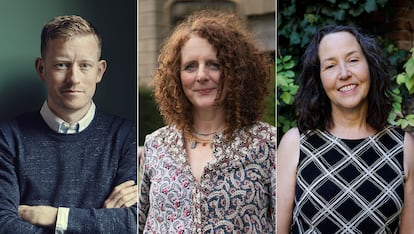The new Irish narrative: Unruly and centered around the inner self
The successes of Maggie O’Farrell and Sally Rooney is indicative of what has happened in the last decade to English-language literature. Is the new Irish tradition linked to the experimental writing of the past?

Irish writer Maggie O’Farrell, 52, says that if she had to take a book to a desert island, it would be James Joyce’s Ulysses. Published in 1922, it was vilified but, above all, loved and extolled. It prompted speculation that the novel as a form might be dying. For Spanish philosopher José Ortega y Gasset, it indicated that the novel had reached its ceiling, that its traditional form had to be abandoned in order for the novel to grow.
Joyce’s Ulysses is so impressive that even in its misreading it yields a new text, as Irish author Sally Rooney, 33, brilliantly explains in an article in the Paris Review. But what does this mean exactly? It means it opens out possibilities, paths, literally ways of being in the world, according to Rooney. In other words, it enlightens. Its publication marked Irish literature so profoundly that everything that mattered, from Flann O’Brien to Samuel Beckett, at the start of the 20th century, passed through rupture, absurdity, and a deliciously disproportionate formal experiment, on the fringes of any kind of margin.
Today, that mutable inner self that turned the stream of consciousness into a labyrinthian game has been transformed into a collective self. According to Luis Solano, O’Farrell’s editor at Asteroide Books, who points out that O’Farrell grew up in Scotland but must inevitably be touched by the Irish tradition, Irish literature today has more in common with the rest of the world than English or North American literature does, and that is what has given it its central role.
Also the editor of Caroline O’Donoghue from Cork, author of the bestseller The Rachel Factor, Solano stresses that this global relevance may account for the fact “that the two favorite authors for the Booker this year were Irishmen Paul Murray and Paul Lynch. It is a literature of the inner self, which, although very much anchored in reality, reflects universal experiences, because its localism is not as invasive as American localism, which is more focused on the woke, or as the British, which is so isolated by Brexit.” What’s new in them, however, has been a decade in the making. Because when the crisis erupted in 2013, Ireland suddenly occupied a new role, in literary terms.
The creation of small Irish publishers, owned by editors who had returned to Ireland after being made redundant by English publishers, relaunched the country’s talent. No one had anything to lose. They were reckoning on what no one had reckoned on before. And what started as a way to make ends meet became a trend when Tracy Bohan, an agent at the Wylie literary agency, sold the first novel by Sally Rooney, then an unknown 26-year-old, to 12 countries.
Rooney had published an essay that made Bohan think she had something. By then, she had already made her debut in the The Stinging Fly literary journal, along with Colin Barrett and other new Irish authors. The Stinging Fly was a launch pad for any young Irish author worth their salt, especially after Rooney’s success. Although it has been going since 1998, it wasn’t until it was made to look like a book in 2005 that it began to be seen as part of what could make a difference — the go-to journal for publishers eager to find new voices.
“The truth is that in both oral tradition and literature, the Irish have always been recognized for being great storytellers, and brilliant at finding new ways to tell them. If we go back to the English canon from the 19th century to the present day, the great names are, for the most part, of Irish origin. Yeats, Wilde, Beckett, Joyce, Shaw, Flann O’Brien. In fact, what would the English canon be without Irish authors?” ask Albert Puigdueta and Roberta Gerhard, Rooney’s editors in Spain where the author’s latest novel, Intermezzo, is about to appear in book stores. Intermezzo is another experiment, borrowing from Joyce and Woolf’s stream of consciousness device, according to editors Emilie Pine and Michael Magee, who add that both Joyce and Woolf are representative of the different paths that Irish literature has taken today.
There is both a social portrait “with authors like Magee, who are managing to talk about the Northern Irish conflict, a taboo until recently,” says Puigdueta, and a generational portrait, which, in Rooney’s case, “is based on a classic English tradition inaugurated by Jane Austen. Austen spoke of the complexity of romantic relationships and social expectations in the 19th century, and flagged up the contradictions, vanities and defects of each of her characters. Rooney does exactly the same in her novels, but with the concerns and spirit of our time,” adds Gerhard.
The list of names that matter is endless: Claire Keegan, Audrey Magee, Donal Ryan, Jessica Andrews, Eimear McBride, 2018 Booker winner Anna Burns, Lisa McInerney, Tana French, Kevin Barry... and it grows by the minute. Did it do so before the 21st century, when few Irish authors aside from John Banville and Colm Tóibín were globally recognized? One need only look at the number of names cited above for the answer. The form, in all cases, is important, not so much because of the tradition they come from but because of the battle each one fights in a highly competitive world in which distinguishing oneself is the only way to stave off instant oblivion. This is something that Irish literature has been good at from the beginning and, though it is now centered on the inner self, it remains forever unruly and new. And, it seems, better than ever.
Sign up for our weekly newsletter to get more English-language news coverage from EL PAÍS USA Edition
Tu suscripción se está usando en otro dispositivo
¿Quieres añadir otro usuario a tu suscripción?
Si continúas leyendo en este dispositivo, no se podrá leer en el otro.
FlechaTu suscripción se está usando en otro dispositivo y solo puedes acceder a EL PAÍS desde un dispositivo a la vez.
Si quieres compartir tu cuenta, cambia tu suscripción a la modalidad Premium, así podrás añadir otro usuario. Cada uno accederá con su propia cuenta de email, lo que os permitirá personalizar vuestra experiencia en EL PAÍS.
¿Tienes una suscripción de empresa? Accede aquí para contratar más cuentas.
En el caso de no saber quién está usando tu cuenta, te recomendamos cambiar tu contraseña aquí.
Si decides continuar compartiendo tu cuenta, este mensaje se mostrará en tu dispositivo y en el de la otra persona que está usando tu cuenta de forma indefinida, afectando a tu experiencia de lectura. Puedes consultar aquí los términos y condiciones de la suscripción digital.









































